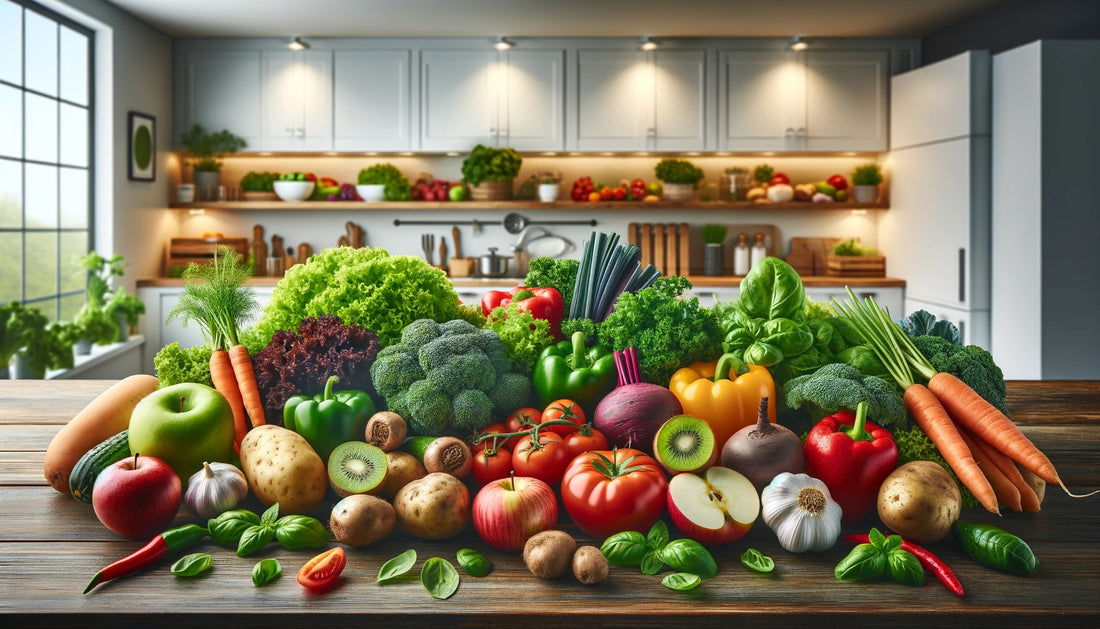Reducing food waste is not only a practical way to save money, it also plays a significant role in fighting climate change.
When food is wasted, all the resources used to produce and transport that food are also wasted, contributing to greenhouse gas emissions.
In fact, food waste accounts for 8-10% of global greenhouse gas emissions.
What's more, when food rots in landfills, it produces methane, a greenhouse gas that is significantly more potent than carbon dioxide.
By minimizing food waste, we can significantly reduce our carbon footprint (and save money too!)
Here are some food storage hacks to do just that.
1. Leafy greens like lettuce, kale & spinach
- Storage hack: Wrap in a damp cloth or towel.
- Why: This helps maintain moisture without creating a soggy environment, keeping the greens crisp and fresh.
- Alternative: Store them in a breathable cotton produce bag.
2. Root Vegetables Like Carrots, Beets & Radishes
- Storage hack: Store in a container filled with sand or in a breathable bag.
- Why: This mimics their natural environment and prevents them from drying out.
- Alternative: Use a perforated basket to allow air circulation while retaining some moisture.
3. Tomatoes
- Storage hack: Keep them at room temperature in a single layer, stem side down.
- Why: Refrigeration can make tomatoes lose their flavor and become mealy. Storing them stem side down helps them ripen evenly.
- Alternative: Place in a paper bag if you need them to ripen faster.
4. Onions, garlic & shallots
- Storage hack: Store in a cool, dark place outside of the fridge and in a mesh bag.
- Why: They need good air circulation to prevent mold and sprouting.
- Alternative: Use a clay pot with ventilation holes designed for storing root vegetables.
5. Peppers
- Storage hack: Keep in the crisper drawer of your refrigerator, unwashed.
- Why: The cool, humid environment of the crisper helps maintain their firmness.
- Alternative: Wrap in a beeswax wrap to keep them from drying out without using plastic.
6. Herbs like cilantro, parsley & basil
- Storage hack: Place in a jar with a little water, like a bouquet, and cover loosely with a reusable cloth.
- Why: This method keeps the herbs hydrated and fresh longer.
- Alternative: Use a cloth herb keeper that maintains humidity.
7. Cucumbers
- Storage hack: Wrap in a damp cloth and store in the fridge.
- Why: Cucumbers are sensitive to cold but need moisture to stay fresh.
- Alternative: Place in a bamboo or wooden container with a damp cloth.
8. Mushrooms
- Storage hack: Keep in a paper bag in the refrigerator.
- Why: The paper bag absorbs excess moisture, preventing the mushrooms from becoming slimy.
- Alternative: Store in a cloth produce bag for similar moisture control.
9. Potatoes
- Storage hack: Store in a cool, dark place in a breathable sack or bowl covered with a cloth. Do not put in the fridge.
- Why: Light and moisture can cause sprouting and rotting. Putting them in the fridge turns their starch into sugars
- Alternative: Use a hessian or burlap sack for good air circulation.
10. Asparagus and scallions
- Storage hack: Put in a glass jar with a little bit of water. Loosely place a plastic bag over them (reuse a plastic bag rather than using a new one!)
- Why: This keeps them hydrated
11. Ginger and lemons
- Storage hack: Put them in the fridge!
- Why: They prefer the cold and last the longest that way
12. Bananas
- Storage hack: Wrap the tops with a beeswax wrap (or by reusing plastic wrap) and put them in their own bowl on the counter.
- Why: Bananas produce ethylene gas, which speeds up ripening. By wrapping the stems, you limit the release of ethylene gas to the rest of the bananas, thereby slowing down the overall ripening process and keeping them fresh longer.
13. Apples, pears & kiwis
- Storage hack: Store them separately from other fruit.
- Why: They also release ethylene gas, which speeds up ripening and rotting of everything else around it.
By using these sustainable methods, you can keep your vegetables fresh and reduce the amount of food that goes to waste (which also saves you money).
These earth-friendly techniques not only extend the life of your produce, but also reduce your carbon emissions.
If you want another way to reduce your plastic use and carbon footprint, check out Weightless Dishwasher Sheets and Laundry Sheets. They're 32 times lighter than liquids, pods and powder detergents while being just as powerful.

